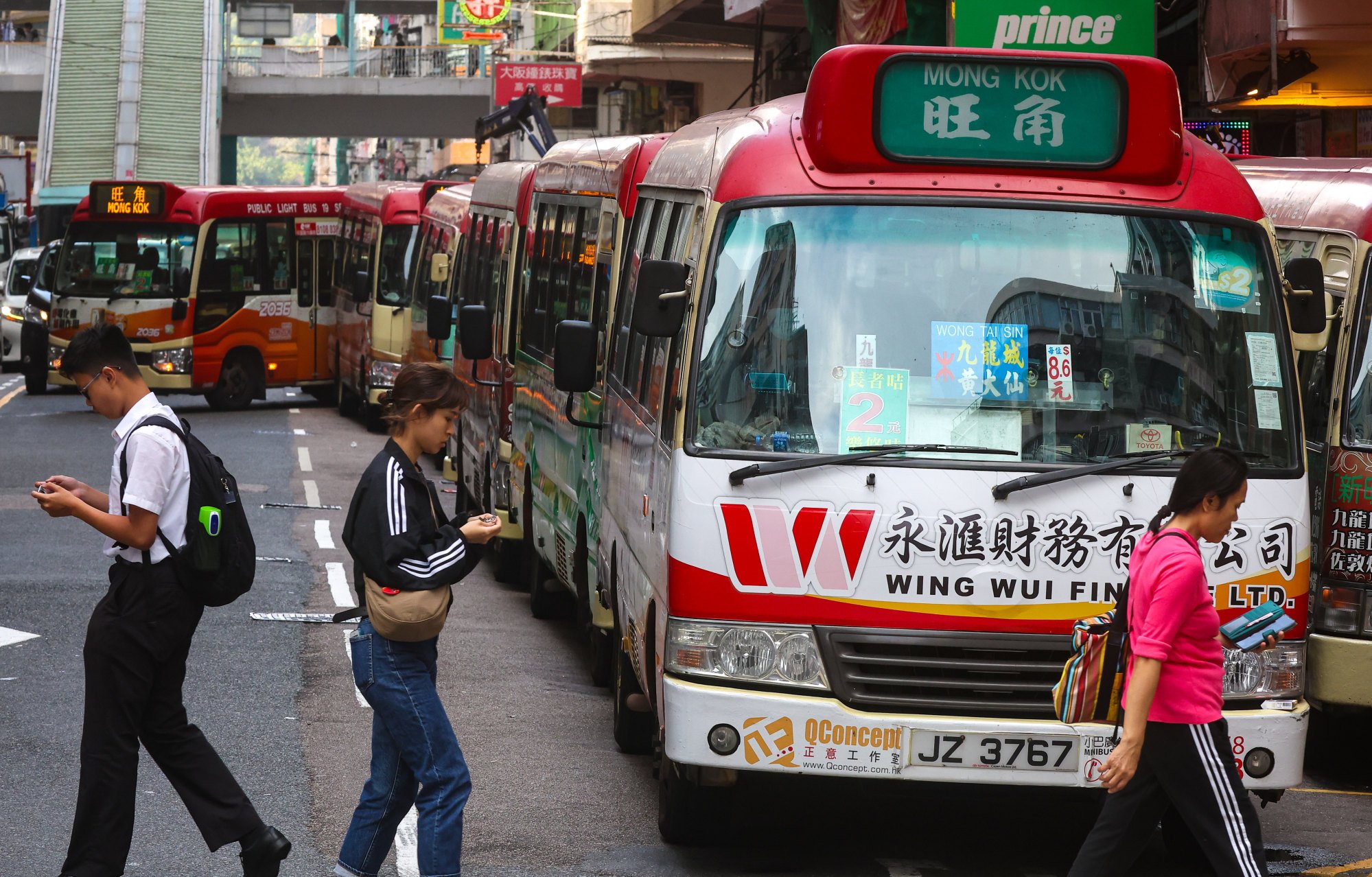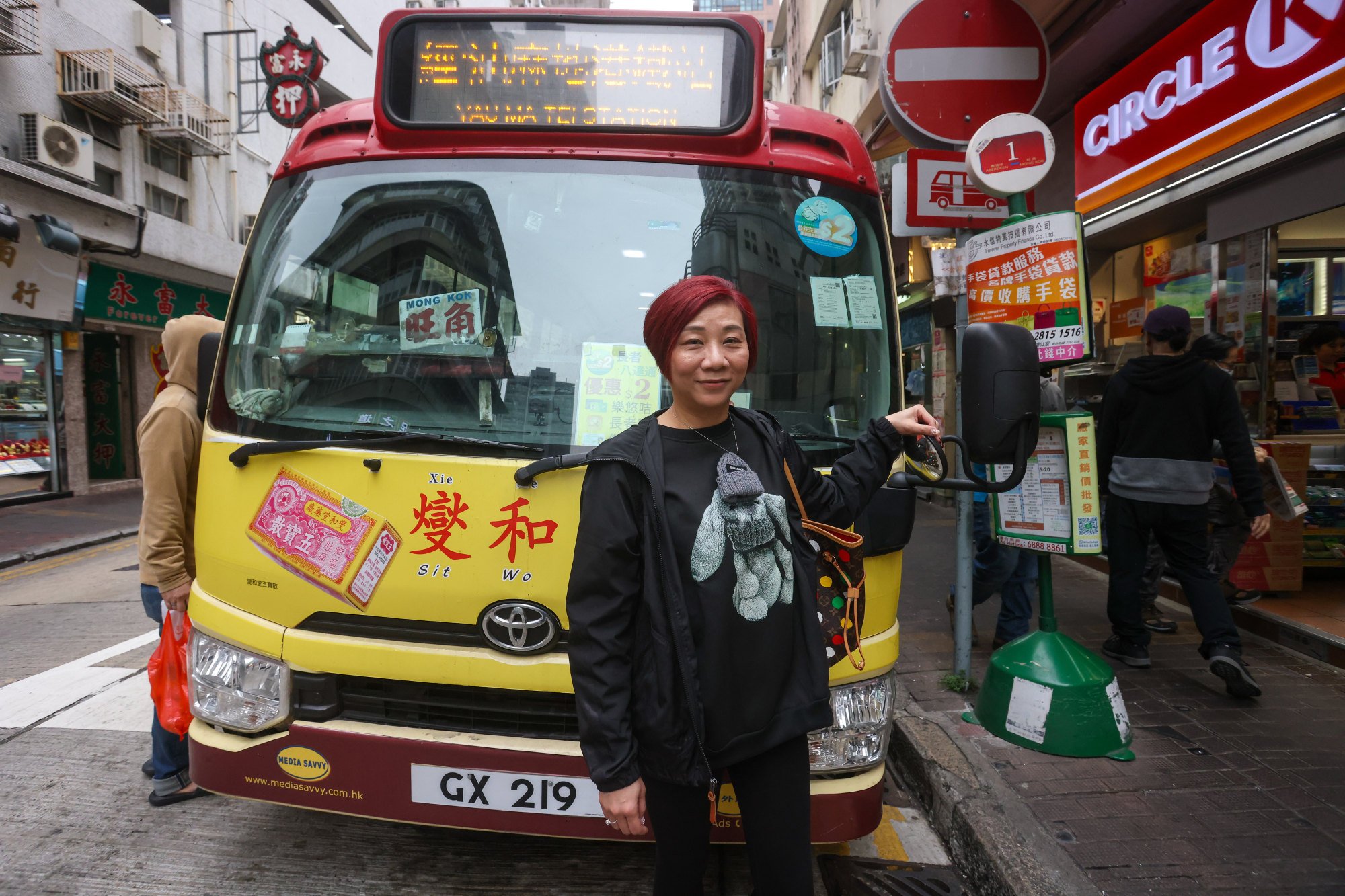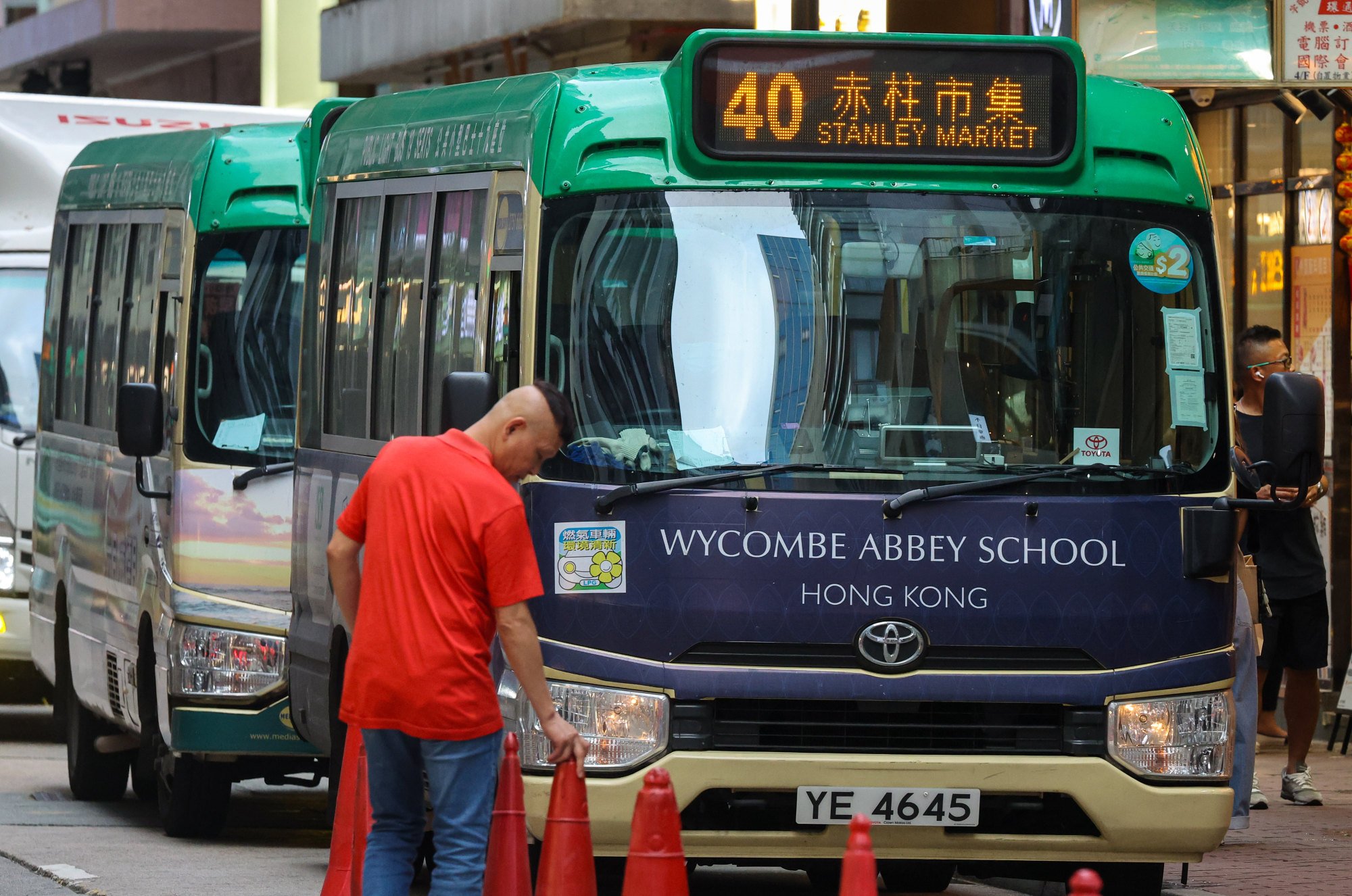
For most of his adult life, 67-year-old Chi-hung* has driven a minibus or operated a fleet of the vehicles in Hong Kong, but now the unprofitability of the business is forcing him to end his career.
Earlier this year, he decided to surrender to his bank the last of his once proud fleet of 13 agile minibuses, known for their speed and flexible service, because he could not repay the installments on a loan for HK$20 million (US$2.56 million).
Even in defeat, he still faces another decade of making instalments, his licence once commanding millions of Hong Kong dollars now worth just a fraction of that amount.
Do you have questions about the biggest topics and trends from around the world? Get the answers with SCMP Knowledge, our new platform of curated content with explainers, FAQs, analyses and infographics brought to you by our award-winning team.

“It’s a great pity but I have no other way out,” he said with a sigh. “Public light buses in Hong Kong have completed their historical mission. Without any government support, the minibus trade is now dead and over.”
The elderly resident is among a generation of drivers confronted with a far-reaching shift in how Hongkongers navigate the city, one fuelled by expanding rail and franchised bus networks, new roads and bridges, and changes in tolls and how locals spend their leisure time.
While many drivers concede the best days are over, they are adamant minibuses can still play a vital role in the city’s transport network, provided the right sort of help is provided, although some experts argue market realities should prevail and allow certain routes to die a natural death.
A shrinking asset
According to a Facebook page set up by residents working in the industry, a bank recently took action against minibus owners who had received HK$4 million to HK$5 million in loans to buy their vehicles or cover other related expenses. Some owners opted to simply abandon their vehicles at route stops or left them in the countryside.
Another 100 minibus drivers could soon face the same fate as those caught in the loan squeeze, industry leaders have warned.
The business, rooted in supply and demand, has changed dramatically. The city caps the number of public light buses at 4,350 vehicles, split between the red-topped ones that are given freedom in choosing how, when and where they operate and green-roofed ones that must adhere to fixed routes and schedules.
Hydrogen start-up H2 to build Hong Kong base as launchpad into overseas markets
That quota pumped the market for licences to dizzying highs. In 2011, permits to operate a minibus fetched as much as HK$8 million, but the Covid-19 pandemic that struck in 2020 pushed the price down to about HK$1 million, and it has dropped further to as little as HK$700,000. In the space of a few years, the assets backing up those hefty bank loans were worth much less.
Chi-hung still faced the risk of bankruptcy if the sale of his final seven minibuses fails to cover his bank loans. “If I am forced to go bankrupt, so be it. I’ve resigned myself to fate,” he said.
Shifting commuter patterns
Decades ago, minibuses were the only transport option for many residents who lived or worked in areas that sat beyond the reach of their lumbering double-decker cousins and the city’s rail network.
Limited to carrying a maximum of either 16 or 19 passengers depending on the type of vehicle, the minibuses could squeeze into Hong Kong’s shoulder-rubbing alleyways or ply roads snaking deep into remote hillsides, often far after franchised routes had stopped services for the night.
But passenger numbers are falling. Minibuses carried more than 1.46 million residents a day last year, down by 17 per cent on the 1.76 million ferried daily in 2019.
Hong Kong minibus firms urged to boost pay for drivers to attract more locals
As of the end of last year, 3,390 green minibuses operated across 360 routes. Regulated by the government, they have fixed routes, fares, bus stops and schedules, while their drivers are company employees with fixed salaries.
Their red-topped siblings, nicknamed “desperado minivans” because of how quickly they travel along highways at night, numbered 950. Their drivers, who either own or rent the vehicles, set their own routes, allow passengers to hop on and off anywhere, and raise their fares when demand goes up, such as during typhoons.
After years of enjoying a niche market, drivers are now facing increasing competition from the city’s growing transport network. Over the past two decades, the MTR network has expanded from a handful of lines running through only the most densely populated areas to a web of arterial routes stretching into nearly every corner of the city.

At the same time, massive new bridges and multi-lane highways are remapping the daily flow of commuters, served by franchised buses operated by a coterie of companies that minibus drivers say are given preferential access to ply the opened routes.
And when not working, residents are increasingly heading north into mainland China to stretch their disposal income further, rather than jumping aboard a minibus to be whooshed away to their favourite mall or restaurant.
From appliances to minibuses: Hong Kong firm goes green with 5 electric vehicles
Chi-hung recalls that during the better days of the industry, he was earning more than HK$70,000 a month by renting out seven minibuses. Now back to being just a driver, he makes about HK$10,000 a month.
“But along with the times, the rent we can charge has been plummeting in the face of an ageing workforce, a lack of new blood joining the industry and keen competition from the MTR and buses,” he said. “Many owners are holding onto a negative asset now.
“The increase in the toll to take the Cross-Harbour Tunnel in Hung Hom to HK$50, the high insurance fee and parking penalties, and the lack of government support has added fuel to the fire.”
‘I can’t bear to give up’
Shadow Yue Yuk-ying, 53, owns one minibus and rents a fleet of 10 red-topped ones to further sublet to 20 drivers, who ply a route stretching from Aberdeen in the south to Mong Kok across Victoria Harbour. In better times, Yue was subletting 64 minibuses that carried passengers along several cross-harbour routes.
“It’s very difficult to make a profit as the operation cost is rising while a lot of drivers have retired with no one willing to join the trade,” she said, pointing to the widening MTR coverage, rising toll fees from the cross-harbour tunnels and a drop in ridership.
Yue must pay a monthly instalment of more than HK$15,000 for the next 15 years to cover the loan for the licence she bought for over HK$2 million a few years ago. But given her net monthly income of slightly more than HK$10,000 for leasing the vehicles, she is forced to think of shutting down the route altogether.

“I may persist for as long as I can. The drivers are all very old, over the age of 70, and if I stop running this route, they will become jobless, something I can’t bear to see,” she said. “Besides, there are still many commuters who need our service on this route, especially during nighttime. I can’t leave them out in the cold.
“I don’t see any hope for the future, but I can’t bear to give up on my years of effort.”
Hong Kong banks repossess 100 minibuses due to overdue payments: operators
Yue insisted that minibuses had a special role to play in public transport and that phasing them out would be a mistake.
“Minibuses can easily travel on narrow or hilly roads that are beyond the reach of franchised double-deckers and the MTR. Additionally, they are faster than buses because they don’t need to stop so many times,” she added.
Yue said the government had denied red minibuses access to new towns springing up in the north of the city and recently completed highways “out of fear” of undermining the business of franchised buses.
To help public light buses survive, the government could open up some restricted areas such as Lantau Island and Tseung Kwan O to red minibuses to ease traffic, she argued.
“I feel very pessimistic about the industry,” she said. “There are indeed loyal passengers who like to take minibuses. But the government has chosen to suppress the operation of public light buses.”
Hong Kong road test for mainland minibus drivers tricky, trade chiefs say
Maintenance firm operator Andy* lamented ever getting into the business. The 35-year-old took out more than HK$9 million in 2017 to operate two red minibuses, believing he was making a smart investment.
“I was upbeat about the minibus industry at that time, so I bought the vehicles and rented them out to drivers as an investment,” he said. “The down payment was only a little more than HK$100,000 so it was cheaper than investing in property.”
But the two vehicles only earn him slightly over HK$20,000 a month, a third of the amount he enjoyed in 2017, and far below the HK$40,000 he will need to pay each month for another 28 years.
“Including other expenses such as insurance, licensing and maintenance fees, I have to dig into my pocket for an extra HK$600,000 a year to keep the two minibuses,” he said.
“When I made the purchase, I had hoped the licensing price would go up like it did in 2011, so I could trade out and make a profit. But the price has just kept going down.”
Hong Kong road test for mainland minibus drivers tricky, trade chiefs say
Andy has been unable to make his loan payments at times in the past and so applied for an interest-free principal repayment arrangement offered by his bank while also borrowing money from friends and families in an attempt to stay on top of his cash flow problems.
“I’ve thought of returning the vehicles to the bank at the risk of going bankrupt. It can happen any time,” he said.
“But I hope that banks can have a loan restructuring arrangement to help minibus operators ride out this difficulty. This can also prevent banks from accumulating bad debts.”
The Hong Kong Monetary Authority said banks would not normally ask their customers for early repayments. It added lenders had repossessed only a few vehicles as collateral after their owners fell behind with their repayments.
An authority spokesman said about 150 minibus operators had been receiving credit help from banks, with 10 at present asking if they could refrain from repaying their principal.
A way out or die a natural death?
Chau Kwok-keung, the chairman of the Taxi and Public Light Bus Association, accused the government of attempting to phase out minibuses and marginalising the trade with its “favouritism” towards bus and rail services.
“The government’s favouritism, inaction and curbs on the minibus trade have taken a toll on operations. It has rejected our proposals of running rehab minibuses,” he said, referring to services for people with mobility issues. “All the new routes are for franchised buses only.”
Chau suggested the government allow minibuses to offer rental services in the Greater Bay Area, Beijing’s plan to link Hong Kong and Macau with nine cities in Guangdong province to create an economic powerhouse.
“There is a great demand for people travelling in the bay area, but there have been a lot of unlicensed vehicles offering cross-border services. The government should allow public light buses to offer rental services,” he said.
Authorities should also create more new routes for minibuses and hand over all of the MTR’s bus services in the New Territories to the industry, Chau argued.

Transport sector legislator Frankie Yick Chi-ming agreed that the rail operator should allow public light buses to take over its feeder operations and argued the government should also speed up the process of converting red minibuses into green ones while allowing the former to operate routes in new towns.
“Public light buses have their value,” he said. “The government should balance the supply of public transport services and allow room for minibuses to survive while protecting the interests of franchised buses.”
But economist Simon Lee Siu-po, an honorary fellow at the Asia-Pacific Institute of Business at the Chinese University of Hong Kong, said minibus operators should bear the risk of losses if they treated their vehicles merely as an investment rather than a public transport service.
“The government can consider buying back their licences and review the minibus policy,” he said. “But this is very difficult given the chaotic coordination between government bureaus and departments.”
Lee suggested the government reduce the scope of minibuses’ operation by removing certain unprofitable routes and retaining those that were inaccessible by larger buses or rail.
“Some unpopular routes should be allowed to have a natural death because the social cost of maintaining these routes is high,” he said. “We have to accept that minibuses have become outdated.”
Digital driving headed for Hong Kong; will cut down on jams at licensing offices
Quentin Cheng Hin-kei, a spokesman for commuter pressure group the Public Transport Research Team, said the days of minibuses were coming to an end.
“Minibuses have completed their historical mission, as seen by their negative asset value, plummeting prices, lack of manpower and ageing workforce,” he said.
Cheng suggested the government cut red minibus routes and turn the essential services to green routes, which would leave about 500 vehicles in service.
A Transport Department spokeswoman said the government had implemented some measures to help red minibuses such as opening up access to some prohibited zones and no-stopping areas.
“The Transport Department will closely monitor the operation and the sustainability of the public light bus trade so that it can continue to perform its role in providing supplementary feeder services, particularly in areas with relatively lower passenger demand or where the use of mass carriers ... is not suitable.”
But Lee, the driver who surrendered the last of his fleet, is doubtful of those promises.
“There is no future for the industry,” he said. “Public light buses will be replaced very soon.”
*Names changed at interviewees’ request
More from South China Morning Post:
- 100 minibuses repossessed in Hong Kong after owners failed to repay bank loans: operators
- Life’s a gas as Hong Kong hydrogen-powered double-decker bus hits streets for maiden trip
- Hong Kong minibus operators urged to boost pay for drivers to attract more local workers
For the latest news from the South China Morning Post download our mobile app. Copyright 2024.











































